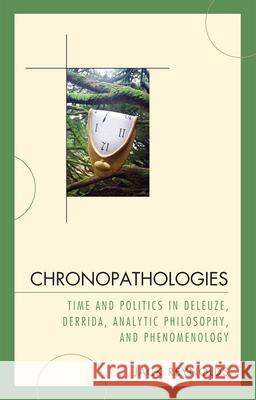Chronopathologies: Time and Politics in Deleuze, Derrida, Analytic Philosophy, and Phenomenology » książka
Chronopathologies: Time and Politics in Deleuze, Derrida, Analytic Philosophy, and Phenomenology
ISBN-13: 9780739132814 / Angielski / Twarda / 2011 / 292 str.
A battle over the politics (and philosophy) of time is a major part of what is at stake in the differences between three competing currents of contemporary philosophy: analytic philosophy, post-structuralist philosophy, and phenomenological philosophy. Avowed or tacit philosophies of time define representatives of each of these groups and also guard against their potential interlocutors. However, by bringing the temporal differences between these philosophical trajectories to the fore, and showing both their methodological presuppositions and their ethico-political implications, this book begins a long overdue dialogue on their respective strengths and weaknesses. It argues that there are systemic temporal problems (chronopathologies) that afflict each, but especially the post-structuralist tradition (focusing on Gilles Deleuze and Jacques Derrida and their prophetic future politics) and the analytic tradition (focusing on John Rawls and philosophical methodology in general, particularly the tendency to oscillate between forms of atemporality and intuition-oriented "presentism"). What is required is a "middle-way" that does not treat the living-present and the pragmatic temporality associated with bodily coping as an epiphenomenon to be explained away as either a transcendental illusion (and as a reactive force that is ethically problematic), or as a subjective/psychological experience that is not ultimately real.











